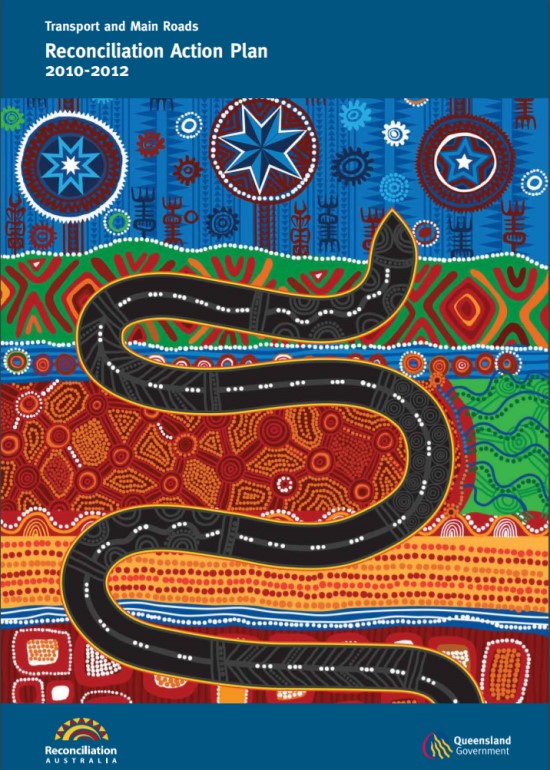Reconciliation Action Plans
Queensland Government Reconciliation Action Plan 2018-2021
The Queensland Government Reconciliation Action Plan 2018-2021 (RAP) demonstrates the Queensland Government’s commitment to building stronger relationships between Aboriginal and Torres Strait Islander peoples, and non-Indigenous Queenslanders.
All RAP actions are aligned to the 5 principles of the Queensland Government Cultural Capability Framework:
- valuing culture
- leadership and accountability
- building cultural capability to improve economic participation
- Aboriginal and Torres Strait Islander engagement
- culturally responsive systems and services.
The whole-of-government Action Plan—the first of its kind in Australia—contains 18 actions and 69 targets. Under this plan, TMR has 2 Agency Specific Actions. The first is our involvement with the Science and Infrastructure Development (SID) Indigenous program and delivering the Indigenous Driver Licensing Program.
Transport and Main Roads Reconciliation Action Plan (2010-2012)
 Cover page of Transport and Main Roads Reconciliation Action Plans (2010-2012)
Cover page of Transport and Main Roads Reconciliation Action Plans (2010-2012)
In 2010, we implemented the Transport and Main Roads Reconciliation Action Plan 2010-12. Working closely with community stakeholders, the plan outlined how we met our commitments under the Council of Australian Governments’ Closing the Gap initiatives and The Queensland Government Reconciliation Action Plan 2009-2012.
We have built on the Transport and Main Roads Reconciliation Action Plan 2010-12 by creating a number of internal policies to deliver our commitments to Close the Gap.
Our Reconciliation Plan actions and initiatives
- 2002 – We led other states in producing the Australian Transport Council's Reconciliation Action Plan. The plan targeted transport agencies' roles in addressing the quality of life issues for Aboriginal and Torres Strait Islander peoples.
- 2002 – We signed a reconciliation statement in late 2002, forging a stronger relationship between South Western District and local First Nations communities.
- 2003 – Central Queensland Region developed 'CQ Indigenous Cultural Heritage Strategic Directions Statement 2003-2008' to manage road projects to preserve Cultural Heritage. Cultural Heritage Management Plans were implemented in consultation with Traditional Owners around Central Queensland during project planning.
- 2008 – We launched our Roads to Reconciliation Action Plan. Reconciliation Action Plans (RAPs) are the blueprint for achieving our vision for reconciliation with Aboriginal and Torres Strait Islander peoples.
- 2009 – Our regions prepared RAPs, each tailored to local geographic and demographic circumstances. We worked closely with regional stakeholder groups which enhanced the relationships our regional teams have with local Aboriginal and Torres Strait Islander communities.
- 2009 – We established an Indigenous Employment Unit dedicated to coordinating Aboriginal and Torres Strait Islander training and employment initiatives and celebrated 10 years of the Aboriginal and Torres Strait Islander Education Toward Employment Scheme.
- 2010 – In consultation with stakeholders, we developed the Transport and Main Roads Reconciliation Action Plan 2010-2012. The blueprint for how our employees, contractors and suppliers can deliver our commitment to closing the gap. We registered our Roads to Reconciliation Action Plan with Reconciliation Australia and we report annually on our progress implementing the plan.
- 2011 – We revised our procurement policies to reflect and encourage First Nations businesses and suppliers to work with TMR and our contractors.
- 2011 – For Reconciliation Week we improved information on our website to provide a comprehensive guide to the programs and services offered by the department.
- 2011 – We sponsored the Partnerships category of the Premier's Reconciliation Awards for Business.
- 2012 – We registered the first Aboriginal and Torres Strait Islander corporation under our Traffic Management Scheme.
- 2012 – We developed and implemented initiatives to support First Nations employees including mentoring and coaching and an employment toolkit to assist staff.
- 2012 – We became a member of the Australian Indigenous Minority Supplier Council database of certified Indigenous business suppliers and implemented an Indigenous Procurement Plan to maximise First Nations employment and supplier opportunities.
- 2018 – Under the Queensland Government's Reconciliation Action Plan 2018-2021 we have 2 Agency Specific Actions in relation to our sponsorship of Science and Infrastructure Development (SID) School Program and delivering the Indigenous Driver Licensing Project. We also contribute to the 6 whole-of-government actions under the Action Plan.